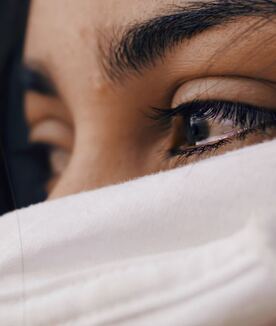|
Most people have heard of PTSD, but might not know what it is or how to manage it. Similarly, lots of us have heard of PTSD 'triggers', and of some of the symptoms of PTSD. I'm going to break it all down for you in this post, so that it's clear what PTSD is and how you might help someone who is struggling. What is PTSD? Lots of people don't realise that PTSD is actually classed as an anxiety disorder. It usually starts after witnessing or experiencing a distressing, traumatic event. Things like:
The main group of people that are often discussed when we talk about PTSD are soldiers, but it's a myth that PTSD can only happen to people in the military. PTSD can happen to anyone, and there are no events that are more "worthy" of trauma than others - if you develop PTSD because you've seen something traumatic, or something traumatic has happened to you, it's not your fault. What are the symptoms of PTSD? PTSD can affect people in a lot of different ways. Here are some of the more common symptoms, which tend to fall into three categories - re-experiencing, hyperarousal, and avoidance.
It's important to note that this list isn't an exhaustive one, but should give you a good idea of how some people with PTSD feel and why. When should I seek help? It's normal to have some combination of the above symptoms after experiencing or witnessing a traumatic event. It can be difficult to sleep or to concentrate, and you might keep thinking about it for a while. Generally, if those symptoms don't start to get better after three months, it might be a good idea to speak to a healthcare professional. Generally, the longer you leave it the worse it can get. What can I do to manage PTSD? For people who are experiencing PTSD there are a number of things that you can do to manage it differently. Firstly, if you're really struggling the best thing you can do is talk to someone. That might be a friend or family member at first, but really needs to be someone trained to help you to manage trauma, like a clinical psychologist. That way you won't feel like you're re-traumatising them - we're trained to manage the impact of the things that people tell us, so you don't need to protect us from the worst of how you're feeling. Next, you need to try to calm down the physical response you're having to the trauma. Relaxation and breathing techniques can really help with this - YouTube has some great relaxation videos that you can use. Start small, and build it up gradually. If you're having flashbacks, grounding techniques can also be useful - carry something with you that you can look at to remind you of the present, like a family photograph or even a small pebble that you can touch, and remind yourself that you're safe. It's also helpful to reconnect with your body, especially after trauma. Dance, spending time walking or cycling in nature, swimming, or anything that puts you back in your body and makes you concentrate on your movements can be really helpful. It's important to try to carry on with daily life as much as you can; the more you retreat into yourself, the harder it can be to get back - but remember it's never impossible. I hope that this post is helpful if you're experiencing PTSD symptoms. Let me know what helps you in the comments.
0 Comments
Leave a Reply. |
AuthorDr Sarah Blackshaw: Clinical Psychologist, blogger, tea drinker, interested in dinosaurs and shiny objects Archives
January 2024
Categories
All
|
Photos from wuestenigel (CC BY 2.0), Ivan Radic (CC BY 2.0), Marco Verch (CC BY 2.0), John Brighenti, wuestenigel, simplicityhunter, Anarchimedia, Find Rehab Centers, wuestenigel, Ivan Radic, Army Medicine, kennethkonica, smallcurio, Jasmic, wuestenigel, JoanDragonfly, BrightStarPhoto21, popofatticus, wuestenigel, forthwithlife, kurotango Clip, ⍘dotism⍘, Tambako the Jaguar, One Click Group UK, Rawpixel Ltd, Blue Mountains Library, wuestenigel, mattbuck4950, h.koppdelaney, verchmarco, The Mom With a Camera, cloudplanner, wuestenigel, verchmarco, OIST (Okinawa Institute of Science and Technology), stevendepolo, juliejordanscott

 RSS Feed
RSS Feed